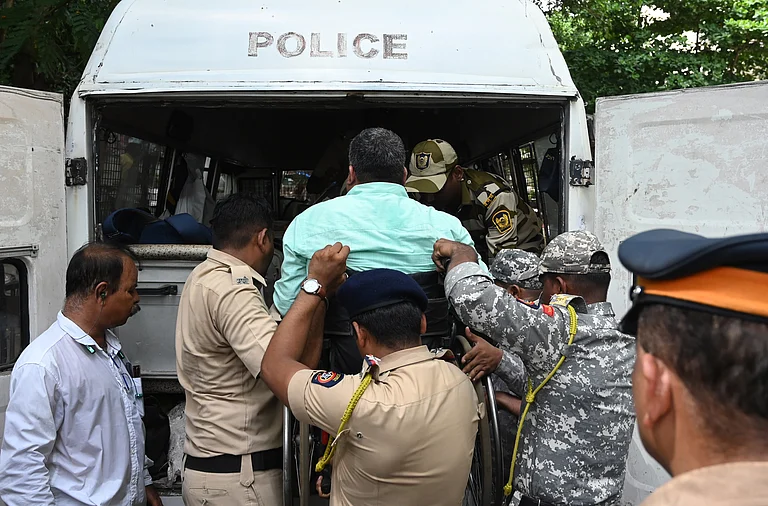
Inclusion for adults with Down syndrome must move from charity to opportunity, focusing on dignity and equity.
NGOs, families, and inclusive employers are proving that neurodivergent individuals bring loyalty, empathy, and value to workplaces.
Real inclusion requires awareness, systemic support, and policies that turn potential into participation.
For most young adults of her age, graduating from college and entering the workforce would be a natural progression, offering not just financial independence but also dignity, purpose, and social connection. However, for Chandni, 19, a young girl with Down syndrome, this transition is a far-fetched idea that comes with a fair set of difficulties, marking a key difference from her peers. For her, finding employment remains a challenging pursuit, affecting not only her economic stability but also her mental health and overall well-being.
We practice ableist apartheid, as Sudhir Shenoy, Senior Vice President at EQUATE Petrochemical Company and Partner at Social Venture Partners India, calls it—posing the greatest barrier to inclusion. The average person, especially in the corporate world, lacks understanding of neurodivergent capabilities. Down syndrome is caused by the presence of an extra chromosome, which affects both physical and mental development. Each person has different abilities, despite some similarities. “We tend to segregate people with intellectual disabilities early, so their world becomes separate from ours. They attend special schools, and parents often hesitate to bring them out. They lack friends and are rarely seen in public. That’s how we have invisibilised them altogether,” says Shenoy.
Inclusion begins with creating space for neurodivergent individuals in daily life, starting with awareness and sensitivity—the true missing piece in our social structure. “We live without knowing someone with such a condition unless they are family. We rarely consider their abilities,” says Noida-based Parul Singh, author, podcaster, and Chandni’s mother.
Like many, Shenoy once held biases and now regrets not having understood them earlier. Sadly, many people still do not. “Disability can seem so overwhelming that we dismiss the possibility of meaningful lives. We need to see this differently,” explains Shenoy.
Work in Progress
Inclusive education and early intervention help children with Down syndrome develop key skills, thriving when their strengths are recognised. Still, adulthood brings new challenges. Imagine the loneliness of exclusion or the frustration of missed opportunities due to biases. “Exclusion not only blocks their potential contribution but can cause isolation and loss of self-worth. These emotional stakes make societal change urgent,” stresses Singh.
Many neurodivergent individuals demonstrate dedication and retention, which employers value. They need opportunities designed with inclusivity in mind. Archana Chandra, Chief Executive Officer of Jai Vakeel Foundation, highlights that neurodivergent young adults possess potential and commitment, but face barriers during workforce transition. "The biggest challenges are based on perception. Employers may assume people with Down syndrome or intellectual disabilities cannot contribute productively, or that accommodating them is too complex. The reality is different. With the right training and support, they thrive in various jobs," says Chandra.
Chandra shares Himanshu’s story: born a ‘blue baby’ with epilepsy, facing medical odds. After completing his education and vocational training, he joined Sodexo’s housekeeping team in 2018, where he remains employed. “Society, which once saw him as a burden, now sees him as a breadwinner,” says Chandra.
Dr Surekha Ramachandran, President of the Down Syndrome Federation of India, agrees India is moving toward inclusion, but progress is slow. “Families and NGOs have created opportunities, but employers and society must see people with Down syndrome as capable workers. We must focus on dignity, not charity,” says Dr Ramachandran.
Yet, much work remains. Bengaluru-based Sania Khimji, 23, influencer, model, and artist, disagrees that enough has been done. “Too often, people still see neurodivergence as something to 'fix' instead of something to understand and embrace. Real sensitisation means listening to our voices, not just speaking for us. It means creating systems—in schools, workplaces, fashion, media—that value different ways of thinking, learning, and expressing ourselves,” she adds.
The job market remains biased, viewing neurodivergent individuals by their limits, not potential. In India, only 22.8% of people with disabilities over 18 are employed, and the labour force participation rate is just 23.8%. For those with intellectual and developmental disabilities, numbers are lower, revealing ongoing stigma and few pathways. The Jai Vakeel Foundation is working towards change—training over 100 young adults in skills such as hospitality and retail, with some now being placed with external support. Job coaches guide staff and employers, building confidence, retention, and success.
Challenges Galore
Dr Ramachandran advocates for expanding this initiative to reach neurodivergent individuals in small towns. “Training in areas like baking, retail, hospitality, and office support has helped many adults with Down syndrome. However, these programs are usually city-based, small-scale, and disconnected from mainstream vocational systems. Ongoing job coaching and support are needed in these areas, too,” she adds.
Many believe asking companies to hire people with intellectual disabilities will suffice. “Currently, our efforts are a patchwork. Much more needs to be done to create an equitable, respectful, and compassionate world, where integrating children with Down Syndrome into the workforce becomes the norm,” says Singh.
Shenoy notes that without a supportive environment where peers and leaders understand disability, success is unlikely. Some accommodation, empathy, and support are needed. “A structured approach is essential—preparing individuals and organisations through awareness and exposure, considering accommodations, and identifying suitable roles. Starting small can be effective,” suggests Shenoy. Partnering with credible organisations that offer sustained support helps ensure a successful integration.
Creating sustainable livelihoods requires more than the efforts of NGOs alone. Employers should open doors and re-imagine roles; educators must prepare students early; policymakers need to incentivise hiring and boost accessibility. “When these align, adults with Down syndrome and intellectual disability become some of the most dedicated, positive contributors,” adds Chandra, echoing Singh.
Employers need to be committed to supporting these individuals and assist in managing traits or helping them understand organisational culture and expectations. Dr Ramachandran highlights that policies should go beyond token gestures. “Employers need incentives and structured support systems to hire and retain people with Down syndrome. Sharing real success stories, providing job coaches, and redefining productivity standards can help address doubts about adaptability or training costs,” she adds.
Successful workplace inclusion isn’t about lowering expectations but about creating the right environment. “The first step is to change one’s attitude towards viewing neurodivergent employees as equal colleagues, rather than as charity hires,” says Chandra.
Alternative Employment
Work is more than just a paycheck—it is a routine, an interaction, an identity, a sense of independence, and a feeling of belonging. “At DSFI, we believe employment is not just about money—it is about respect, independence, and being part of society. With the right support, adults with Down syndrome can thrive in the workplace,” argues Dr Ramachandran. She explains that small businesses and entrepreneurs can play a significant role in inclusion because they are more flexible and open to innovation. Grassroots organisations and NGOs have begun bridging this gap through their skill-building programs, equipping young adults with vocational training tailored to their strengths, including baking, computer literacy, customer service, and the performing arts. But without wider systemic change, these remain isolated successes rather than mainstream practice. “Many adults with Down syndrome have excelled in small cafés, home-based businesses, and creative ventures. The gig economy can also provide flexible, interest-based jobs, but these need proper structure and support to be sustainable,” she adds.
Much of the progress so far has been driven by parents. Often, the responsibility of creating livelihood opportunities for children primarily rests with parents. Families have become advocates, entrepreneurs, and even employers to help their children enter the workforce. “Mainstream workforce opportunities are scarce, and many young adults seeking employment turn to hustling, which enables them to gain financial independence and a sense of dignity, but establishing oneself to make a decent amount every month is easier said than done,” rues Singh. Her daughter Chandni is currently enrolled in vocational training at her school-cum-training centre, Mata Bhagavanti Chadda Niketan, and creates artwork and sells it.
However, not every parent has the resources or networks to create such opportunities. The responsibility of building inclusive workplaces must extend beyond individual families to schools, policymakers, and other companies. Singh advocates for job reservations for such individuals, making it mandatory to include them in government employment, which could facilitate their integration with greater ease. Achieving this may require effort to provide appropriate vocational training that helps these individuals become employable, representing the first step toward securing their rightful place in society.
However, Khimji, who chose to forge her own success story in the world of fashion and art with her mother Mudita’s help, says, “As someone with Down syndrome, I break barriers and challenge stereotypes every day. When people see me walking the runway, painting, or speaking up on social media, I hope they know what’s truly possible when we believe in ourselves and are given the chance.” In her own way, she’s trying to show others, especially those with disabilities, that they are worthy of living big dreams and they don’t have to fit into a box society has created for them. “Everyone’s success story is different, and that’s what makes each journey powerful. If my story can help even one person feel seen, valued, and capable, then I know I’m doing something right,” reiterates Khimji.
Stories of Change
But why do so few employers take the step toward inclusive hiring? Conversations often reveal entrenched misconceptions: concerns about productivity, training costs, or whether employees with Down syndrome can adapt to a “fast-paced” work culture. Yet, real-world examples consistently disprove these fears.
The impact of inclusive hiring is clear in the success stories. When Jehangir Surti, Partner at Prodon Enterprises, hired Jai Vakeel Foundation’s first student for an external placement, he told us, “It’s not only helped him, it’s helped us. It started off with helping him, but in a way, we’ve helped ourselves also,” says Chandra. Within a year, he welcomed a second student.
Organisations such as Youth4Jobs, Mann Foundation, and Rotary Sanskar Dham have trained and placed neurodivergent adults in workplaces like Amazon and Lemon Tree, demonstrating the possibility when intent meets action and highlighting the need for many more such organisations, employers, and ecosystems to step forward.
Employers often share that neurodivergent employees bring loyalty, consistency, and a positive energy that uplifts the entire team. These experiences remind us that inclusion is never one-sided; it is a two-way street. It benefits individuals, strengthens workplaces, and inspires communities. “Our vision is of a world where empathy and equity are part of everyday life, and where each person’s unique strengths are recognised and celebrated,” adds Chandra.
The EQUATE Group hired three neurodivergent individuals last year, the first such recruitment in the oil or petrochemical sector. “It’s been great to see how they've integrated into it, how the team has come together to be their buddies and partners, and help them out,” adds Shenoy. Of the three, one works as a storekeeper, overseeing all the records of what goes in and out of the stores. The other handles visitors and administration at the front desk, and the third manages the lab, maintaining records of inventory among other responsibilities.
Employees with Down syndrome are dependable, diligent, and bring unique strengths to the workplace—be it patience in customer-facing roles, attention to detail in repetitive tasks, or the ability to infuse empathy into team dynamics. Companies that have adopted inclusive hiring practices report increased morale, stronger team cohesion, and more positive customer feedback. “When organisations bring in someone with a disability, the entire team often rallies around them. Acceptance rather than feeling threatened or uncomfortable with differences fosters a more empathetic environment across the organisation,” adds Shenoy.
Inclusion Matters
The purpose of Down Syndrome Awareness Month is to go beyond just raising awareness to drive meaningful, actionable change for our fellow humans, those born with neurodivergence, and to act with intent.
However, awareness must be more than just posters or PowerPoint slides, Shenoy reminds. Chandra, too, agrees that awareness must go beyond hashtags and symbolic gestures; it must lead to real, measurable and actionable change. “Imagine if every employer pledged to hire at least one neurodivergent individual. If every school committed to building inclusive classrooms. If every policymaker pushed for equity in education and employment. These are the steps that move us from awareness to opportunity, from inclusion in words to inclusion in practice,” Chandra reiterates.
As individuals, change starts with the simple act of acknowledgement that they exist. “It means having a conversation, making them seen, heard and not just considered but also included,” underscores Shenoy.
As part of the Jai Vakeel Foundation’s #ActToInclude campaign, the newly instituted “Inclusion Ke Sitare Awards”, supported by Arth by Emcure, celebrates champions of neuro-inclusion across diverse sectors. “Through this Award, we aim to showcase that neurodivergent and neurotypical individuals can co-exist, co-learn, and co-work. This also includes those with Down syndrome. When that happens, we create a society that is truly tolerant, empathetic, and kind. By honouring these champions year after year, we hope to inspire many more to follow their lead and build a more inclusive world that benefits all,” says Chandra.
The act of inclusion is a work in progress. Singh emphasises that ground-level awareness and sensitisation are foundational to building an inclusive world for our children. “We should pledge our dedication to this year’s theme: Improve Our Support Systems. It must originate from the community level, with individuals making efforts to raise awareness and foster sensitivity toward neurodivergent individuals.”
At its core, this is not just about jobs—it is about dignity, self-worth, and social justice. Like Khimji, who outlines the message that to build a truly inclusive world, we need empathy to understand each other’s experiences, dignity to treat every person with respect, and equity to provide the support and access that different people need to thrive. “It’s not about making everyone the same—it’s about celebrating what makes us different and ensuring everyone belongs,” she adds.
Every child with Down syndrome deserves the chance to contribute, to belong, and to dream. Workplaces that open their doors to them discover more than capable employees; they discover resilience, joy, and humanity that enrich their culture. If society can move beyond outdated prejudices and reimagine the workplace as a space for all, the missing piece in the journey of children with Down syndrome—meaningful employment—will finally fall into place.
views expressed are are personal.
Shillpi A Singh is an award-winning communications professional, independent journalist and translator.






























